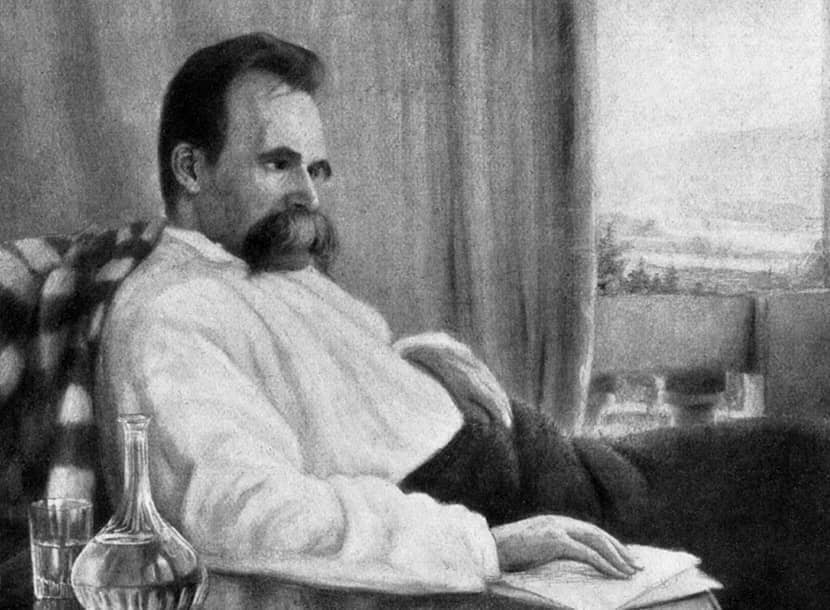A few weeks after Friedrich Nietzsche bragged to an admirer that he had completed a ruthless attack on our Lord, he collapsed, had convulsions, shouted like a madman and never recovered his faculties again. It was early 1889. He was 44 years old, his books had just begun to be noticed, and he lived for a decade longer, empty-eyed, silent and entirely unaware of the fame that was about to engulf him.
Was his tragic end divine punishment for his sacrilege? My devout Catholic wife begs to differ. Our Lord is not vengeful, she insists. That’s the only thing wrong with him, I reply. Although Darwin’s On the Origin of Species started the anti-God ball rolling in 1859, Nietzsche’s nervous breakdown and anti-Christian profanities had an enormous effect because the genius-madman had been a man of faith. Both his father and grandfather were Lutheran pastors, and young Nietzsche was so pious he was nicknamed ‘the little pastor’. Yet it was the Hellenes of ancient times who drew the little pastor away from Christianity and into the world of Homer and the Olympian gods. Schopenhauer and Wagner followed and soon the little pastor was into German myths, excessive masturbation (according to Wagner) and madness. The great religious and classical scholar Taki believes that if Herr Nietzsche had kept faith with the poor carpenter’s Bethlehem family instead of going Greek, he would have remained sane.
But this is my 45th Christmas issue and as a sinner, as well as a devout Christian, I need to reassert that at the heart of faith is mystery. God is not an object, and he is beyond our knowing, as is Jesus Christ. I was brought up to fear God, but as I grew older I learned to love him as much as I love Jesus. The Virgin Mary, her son and God are one and the same to me, and to hell with theologians who split them up along with their infinities.
Is my faith tied up with some vague promise of an afterlife? To be perfectly honest, the answer to that question is maybe, although I don’t count on it too much. One thing I don’t do is pray for things I desire. That’s called manipulation, and the Almighty does not do manipulation.
One reason why I am certain that most intellectuals will go to Hell is their bizarre claims against the Virgin birth of Christ, a theology they deem naive and meant for those who see sexuality as sinful. As so often, the eggheads get it completely wrong. The pure untouched body represents virtue and innocence, not a Kardashian-like overused and over-exposed figure. The reason violence is on the rise everywhere is the downgrading of Christianity by our so-called elite, whose company will one day soon represent the new Hell. No more fires and Dantean circles; just the nearness of Dorsey, Zuckerberg and their ilk.
Mind you, when John Calvin and Martin Luther reformed the church, new forms of communication and scientific discovery were changing the world. But look who did the reforming. Calvin and Luther were great men with great minds who were devout Christians. The bums who are anti-Christian nowadays are not fit to register as humans. And yet the bad guys are winning. In America, a nation that makes Sodom and Gomorrah look like Eden, fewer than half of Americans claim membership of a church. As recently as 1999, 70 per cent belonged to a church, now it’s down to 47 per cent. With the kind of scum who run Hollywood and TV at present, I am surprised that it is as much as that. Christianity is under attack as never before, and these attacks come from the so-called elite who produce the movies that Americans watch non-stop.
Just think about it: Christianity is now subordinate to affiliations such as ethnic identity, sport-team loyalty and even superhero devotion. Among university-educated people many now see the denunciation of Christianity as a mark of sophistication. The secularisation of the meritocracy is considered a good thing by the unbelieving rabble; I see it as the reason why so many need drugs, porn and booze to get through their dull, useless lives.
Never mind, it’s Christmas and I must be charitable. But I find it hard because of the bums of Silicon Valley. Spiritual ideas, for them, take the form of wellness, which is hardly a metaphysical belief. Can any of you imagine a Bezos or a Zuckerberg or a Dorsey getting up early, going to church and reciting creeds they don’t believe in? Because if they did, they would not have done what they have done to their fellow man. Step all over them, that is. Again, never mind: it’s Christmas.
The even bigger danger to Christmas and to Christianity comes from those who actually wrote the following: ‘The default to “Merry Christmas” as a normal greeting is also white supremacy culture at work.’ I will not name them in my Xmas column; suffice to say that you, dear readers, know exactly where they will end up. In the meantime, I wish all Spectator readers and those who produce the magazine every week the happiest of Christmases ever.







Comments